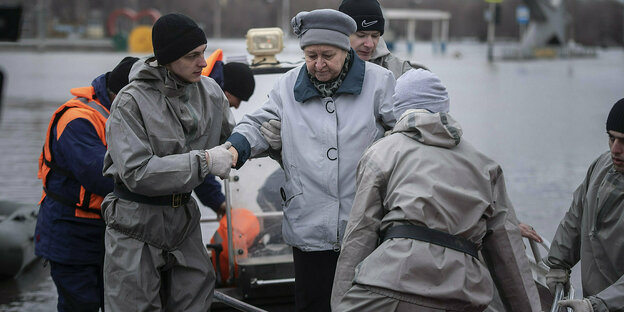After the Russian dam burst in the Urals, people want answers from their government. But the governor denies any responsibility.

Slow rescue: helpers in Orsk, near the border with Kazakhstan Photo: ap
MOSCOW taz | As the water continues to slowly recede in the streets of Orsk, several hundred people gather in front of the city administration on Monday afternoon. Behind them, in front of the theater, stands a statue of Lenin, the tram abruptly passes through Komsomol Square. The Urals did not reach here, flooding almost 7,000 houses in this industrial city on the border with Kazakhstan due to multiple dam failures a few kilometers away.
“We only want to know one thing: what will happen to our houses? “What will become of us?” a woman almost shouted. “How are we supposed to continue living? “Who takes responsibility?” asks a man. They are angry because they feel alone. Authorities had warned people not to attend an “unauthorized gathering.” However, they warned too late about the rising waters of the Urals. This resentment is driving Orsk residents to the streets, in a country where protesting is dangerous and questions are not welcome.
Women and men surround Vasily Kosupitsa, waiting for answers from their mayor. It was he who wanted to put her to rest last Wednesday. The dam would hold, there was no danger, he stated. Less than two days later, the old town of Orsk was completely underwater. Kosupiza barely has a voice in this spontaneous protest. He can't give answers. “Go away,” people shout. “Resign!” “Shame!”
Orsk is a politically sleepy city. When people take to the streets here, they are not demanding more freedoms and human rights, they are simply concerned about survival. These are water and bread, gas and electricity. It is about a roof over the head and yet also about something political: responsibility for the fact that here, despite the concerns, even of neighboring Kazakhstan, many things have gone wrong. That is why they demand the resignation of their mayor.
Presumptuous and derogatory phrases from the authorities
But those in power have little practice in communicating with people. How detached they are from the problems of angry people can also be seen in Orsk, when Denis Pasler, governor of the Orenburg region, talks to some protesters. “Those are simply the conditions we live in. There was autumn, winter, rain and many other factors,” he says in the Orsk city administration. But an “uncontrollable horde” wants to “find a single person responsible,” he says. There will not be this “one.” “We are all to blame. “Now we must come together as true patriots, get through this and come out stronger.”
They are pretentious, even derogatory, phrases that express neither understanding nor compassion for people's suffering. Pasler looks directly into the faces of those in need and says condescendingly: “Do you think you are the only ones suffering from this? I didn't go on my first vacation in five years, I'm here with you, I didn't have time to wash or change my clothes. “The entire region is not doing well.” Invalidating and trivializing the concerns of others is common in Russia.
Nobody wants to admit their guilt. But everyone wants to find someone to blame. Pasler promises that “everything will be restored” and that compensation will be paid. However, no one is clear what their phrases mean for each individual. “Where are those lists everyone talks about? Where can I register so I can get at least 50,000 rubles (equivalent to 500 euros) for my lost property? They send me from one emergency shelter to another,” writes a woman named Julia in an Orsk chat.
Meanwhile, water levels continue to rise. Now it is no longer in Orsk, but further west. The water reaches the regional capital, Orenburg, whose mayor clearly tells its inhabitants: “It will be worse than ever.”